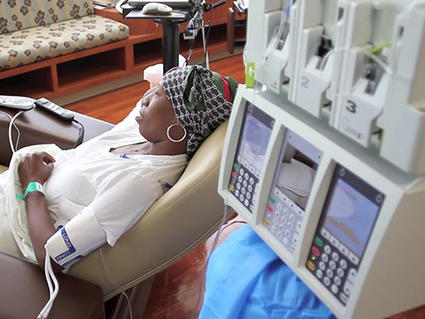
Roswell Park Team Identifies New Cause of Chemotherapy Resistance in Triple-Negative Breast Cancer
On Jan. 10, 2025, researchers at Roswell Park Comprehensive Cancer Center have identified a previously unknown cause of resistance to doxorubicin, a mainstay of treatment for Triple-negative breast cancer (TNBC) an aggressive, fast-growing breast cancer subtype.
TNBC presents numerous treatment challenges. Compared with other forms of breast cancer, it’s more likely to have spread at the time of diagnosis and is more likely to recur, largely because it becomes resistant to chemotherapy. The team’s study points to a new strategy for overcoming this resistance to treatment, using drugs known as IMPDH2 inhibitors.
A team led by Anna Bianchi-Smiraglia, PhD, Assistant Professor of Oncology, Department of Cell Stress Biology, discovered that inosine monophosphate dehydrogenase 2 (IMPDH2) helps protect cancer cells from doxorubicin, and that IMPDH2-inhibitor drugs already on the market can target that protection.
IMPDH2 is a metabolic enzyme that assists in the production of the nucleotide guanine triphosphate (GTP), which previously has been shown to help cancer metastasize, or spread. High expression of IMPDH2 has been linked to chemotherapy resistance and poor survival in several types of cancer, including osteosarcoma, glioblastoma and colorectal cancer. However, until now it was not clear whether the same held true for TNBC.
Through their analysis of publicly available datasets, the research team found that TNBC patients who had a high expression of IMPDH2 had a worse overall prognosis, including lower recurrence-free survival after receiving chemotherapy before or after surgery. This finding suggests that IMPDH2 levels in TNBC patients could be used predict both their response to treatment and their prognosis or expected clinical outcomes.
Through preclinical studies involving doxorubicin-resistant models of TNBC, the team discovered that IMPDH2 levels actually increased following multiple rounds of treatment with increasing doses of doxorubicin. However, while this helped the cells become more resistant to doxorubicin, it also made them far more vulnerable to the IMPDH2-inhibitor drugs ribavirin (RBV) and mycophenolic acid (MPA), which reduced the growth of chemo-resistant tumors. Both ribavirin and mycophenolic acid are already FDA-approved for non-cancer-related conditions.The study was published in Scientific Reports.
Tags:
Source: Newswise
Credit:
